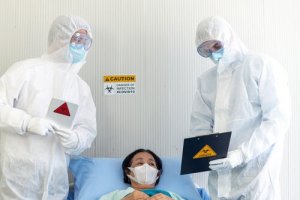Why Is Quarantine Necessary in Cases such as Coronavirus?


Written and verified by the doctor Leonardo Biolatto
So far, the most effective measure to control the spread of coronavirus is quarantine. There are no specific medications to treat this disease and there’s no vaccine against it. For these and other reasons, quarantine is the best measure to prevent more and more people from exposing themselves to danger.
At least for now, what makes coronavirus (COVID-19) riskier is that it’s a virus that experts don’t have enough information about. It’s new and, therefore, they don’t know how it can behave. In fact, there isn’t enough data on how it spreads. Thus, quarantine is the ideal preventive measure.
What experts did discover was that COVID-19 is highly contagious, which is why it’s expanding rapidly, as it occurred in China, Korea, and Italy. Its mortality rate isn’t clear because, while it’s between 2 and 4% in China, the rest of the world doesn’t show the same figures.
Isolation
The first thing to clarify is that isolation isn’t the same as quarantine. Isolation is a mandatory measure that’s applied when a person has been diagnosed with coronavirus. When this happens, they should immediately avoid any direct contact with other human beings.
A person with coronavirus will experience the symptoms within three to six weeks, during which time they must be completely isolated from those around them. It’s ideal that, if the infected person lives with other people, they should stay elsewhere while the disease passes.
If this isn’t possible, it’s advisable to isolate the sick person in a room and have no contact with them. They must have their own bathroom and avoid sharing plates, cutlery, bedding, or any utensil. Those around them should use specialized surgical masks. In severe cases, the patient should be transferred to a hospital in an ambulance, not in another type of transport.

Coronavirus quarantine
Quarantine is a measure that applies to people who don’t have the disease but who have come into contact with someone who has it or who may have it. It applies to those who have traveled to places where there are clear outbreaks of coronavirus.
It isn’t necessary for a person to have symptoms for them to have to go into quarantine. The mere suspicion of having had contact with a sick person is reason enough to go into quarantine because the virus has different incubation periods and doesn’t always lead to visible symptoms.
In these cases, not taking it seriously is very dangerous. The greatest risk is those who have been exposed to COVID-19 and decide not to take precautionary measures because they feel good. They may have the virus and spread it to people who are highly vulnerable, thus risking their lives.

Find out more here: How to Avoid Catching and Spreading Coronavirus
How to quarantine
The word “quarantine” is used generically but that doesn’t mean it always amounts to 40 days. In the case of coronavirus, it’s advisable for you to self-isolate for two weeks or 14 days if you suspect you came into contact with infected people and have no symptoms.
The vast majority of cases manifest during that period of time. Although sometimes the first symptoms manifest within a few hours, and others do after two weeks, these represent a minority. Thus, 14 days is a period that ensures a minimal risk of infection.
Remember that the mere fact of having been one to three feet from an infected person can lead to infection. Thus, you don’t have to have gone to China or Italy but simply have come into contact with people who were there or who have symptoms of the disease.
According to the latest official data, there are more than 200,000 cases in more than 100 countries worldwide. So far, approximately 8000 people have died from this disease. The expansion potential is very high because, even in areas where there are still few cases, such as Latin America, the disease has spread quickly.
All cited sources were thoroughly reviewed by our team to ensure their quality, reliability, currency, and validity. The bibliography of this article was considered reliable and of academic or scientific accuracy.
- IFLS Science. (2020). How Many People Are Currently Under Quarantine Because Of Coronavirus? Recuperado 10 marzo, 2020, de https://www.iflscience.com/health-and-medicine/people-currently-under-quarantine-coronavirus/
- Zuñiga-Sosa, Evelyn Alexandra, et al. “Tipificación del antígeno Duffy como método indirecto para identificar individuos asintomáticos de malaria.” Acta Bioquímica Clínica Latinoamericana 53.1 (2019): 71-77.
- Alpuche-Aranda, Celia M. “Infecciones emergentes el gran reto de la salud global: Covid-19.” salud pública de méxico 62.2, Mar-Abr (2020): 123-124.
This text is provided for informational purposes only and does not replace consultation with a professional. If in doubt, consult your specialist.








